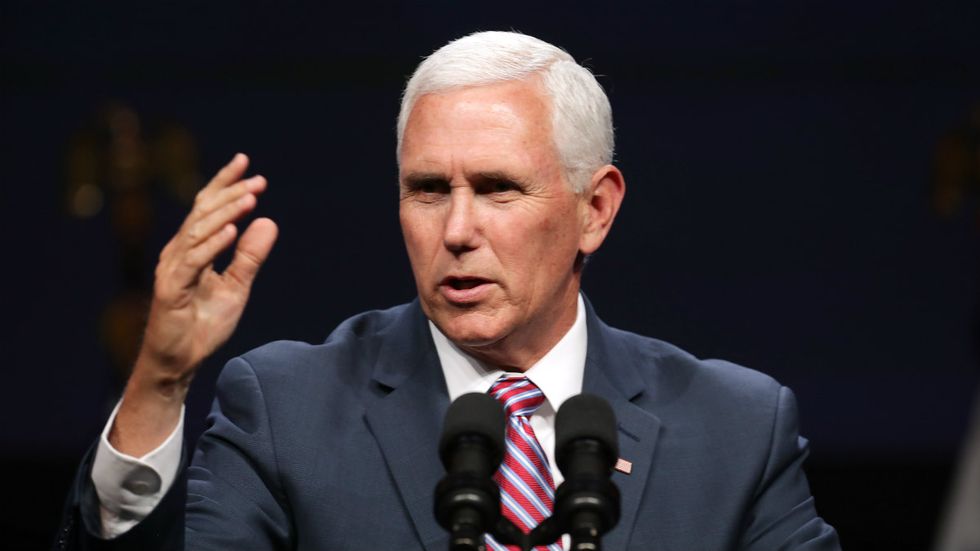
© 2024 Blaze Media LLC. All rights reserved.
Mike Pence announces Trump administration will fight back against lower court nationwide injunctions
May 09, 2019
At a Wednesday speech at a Federalist Society event in Washington, D.C., Vice President Mike Pence took aim at judicial activism and the practice of lower courts of unilaterally blocking laws and policies from taking effect.
The administration plans to fight this practice, Pence explained, by bringing the question of nationwide injunctions before the Supreme Court.
"The Supreme Court of the United States must clarify that district judges can decide no more than the cases before them," said Pence. "And it’s imperative that we restore the historic tradition that district judges do not set policy for the whole nation. In the days ahead, our administration will seek opportunities to put this very question before the Supreme Court to ensure that decisions affecting every American are made either by those elected to represent the American people or by the highest court in the land."
"The kind of government control that our Founders were concerned about is too often exerted by the administrative state in this country," Pence explained. "And it's been emerging in recent years in the federal judiciary in the form of nationwide injunctions."
A nationwide injunction is a court order sent out by lower judges that prevents the executive branch from enforcing policies, statutes and/or regulations all across the country. Such orders affect parties who aren't remotely involved in the case and are one of the most popular tools of activist judges to thwart the efforts of the Trump White House.
And it's not just the White House that has a problem with nationwide injunctions. During his remarks, Pence also cited a 2018 Supreme Court Opinion from Justice Clarence Thomas, who wrote:
These injunctions are beginning to take a toll on the federal court system— preventing legal questions from percolating through the federal courts, encouraging forum shopping, and making every case a national emergency for the courts and for the Executive Branch.I am skeptical that district courts have the authority to enter universal injunctions. These injunctions did not emerge until a century and a half after the founding. And they appear to be inconsistent with longstanding limits on equitable relief and the power of Article III courts. If their popularity continues, this Court must address their legality.
Indeed, while our federal courts go back to the earliest days of our republic, the ability of lower court judges to unilaterally hamstring the executive with the flick of a pen and bang of a gavel is a far more recent innovation.
"This obstruction at the district [court] level is unprecedented. Studies show that there's not a single example of a nationwide injunction in the first 175 years of our nation's history," Pence said. "The truth is, our administration has been unfairly hit with more nationwide injunctions than the first 40 American presidents combined."
The vice president also made the case that such injunctions are hazardous to Americans' safety, arguing that they compromise national security by "obstructing the lawful ability of the President to stop threats to the homeland, where he sees them."
Lest we forget, Trump v. Hawaii — about which Justice Thomas wrote the earlier opinion — was over President Trump's ability to use the president's plenary powers to pause immigration due to national security concerns.
"These injunctions undermine the rule of law and the separation of powers that are central to our nation’s founding, that lie at the very heart of our Constitution," Pence concluded. "And so I say to all those gathered here, for the sake of our liberty, our security, our prosperity, and the separation of powers: This era of judicial activism must come to an end."
While new legal precedent from the Supreme Court might be the most realistic way to end the capricious practice of nationwide injunctions with a divided national government, it isn't the only way; Congress also has the power to act.
Last session, the GOP-controlled House Judiciary Committee considered and approved a bill that would have ended the universal injunctions once and for all, despite protests from committee Democrats.
"We are at a crossroads in our nation," wrote Conservative Review's Daniel Horowitz about a recent nationwide injunction case out of California. "Either we have three branches of government, or we have one branch of government, with the most liberal of the 94 district courts controlling every aspect of our country."
#mc_embed_signup{background:#fff; clear:left; font:14px}
/* Add your own MailChimp form style overrides in your site stylesheet or in this style block.
We recommend moving this block and the preceding CSS link to the HEAD of your HTML file. */
Want to leave a tip?
We answer to you. Help keep our content free of advertisers and big tech censorship by leaving a tip today.
Want to join the conversation?
Already a subscriber?
more stories
Sign up for the Blaze newsletter
By signing up, you agree to our Privacy Policy and Terms of Use, and agree to receive content that may sometimes include advertisements. You may opt out at any time.
© 2024 Blaze Media LLC. All rights reserved.
Get the stories that matter most delivered directly to your inbox.
By signing up, you agree to our Privacy Policy and Terms of Use, and agree to receive content that may sometimes include advertisements. You may opt out at any time.


